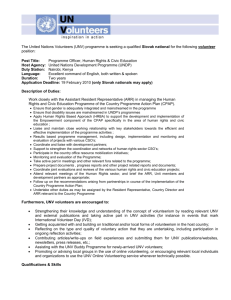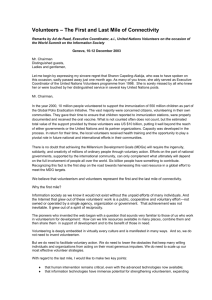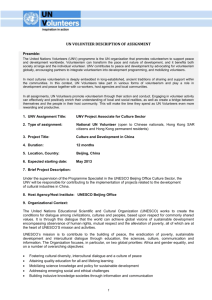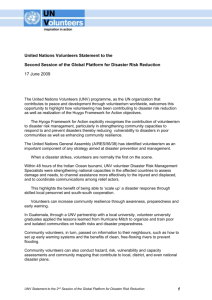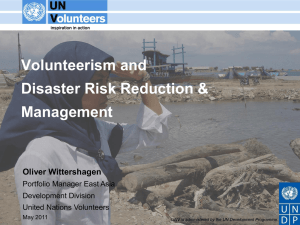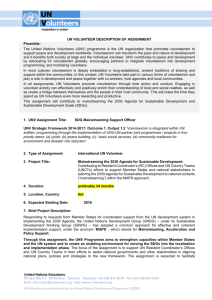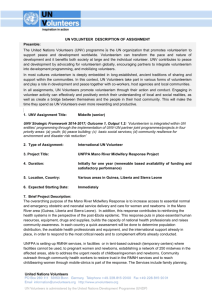Fax message - United Nations Volunteers
advertisement
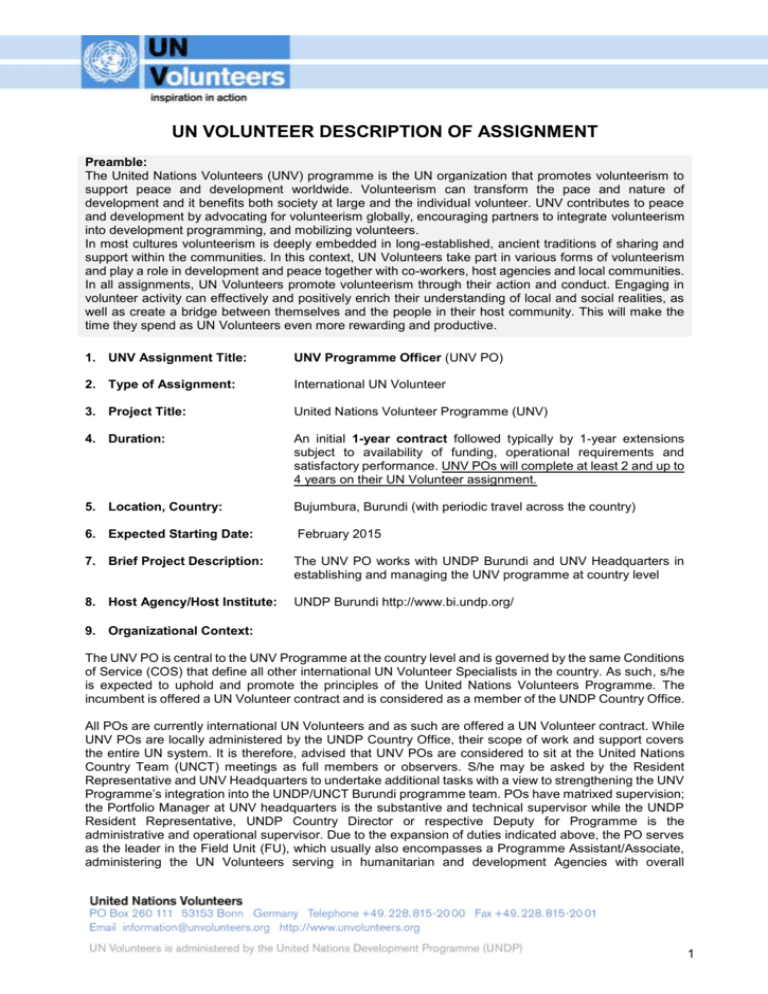
UN VOLUNTEER DESCRIPTION OF ASSIGNMENT Preamble: The United Nations Volunteers (UNV) programme is the UN organization that promotes volunteerism to support peace and development worldwide. Volunteerism can transform the pace and nature of development and it benefits both society at large and the individual volunteer. UNV contributes to peace and development by advocating for volunteerism globally, encouraging partners to integrate volunteerism into development programming, and mobilizing volunteers. In most cultures volunteerism is deeply embedded in long-established, ancient traditions of sharing and support within the communities. In this context, UN Volunteers take part in various forms of volunteerism and play a role in development and peace together with co-workers, host agencies and local communities. In all assignments, UN Volunteers promote volunteerism through their action and conduct. Engaging in volunteer activity can effectively and positively enrich their understanding of local and social realities, as well as create a bridge between themselves and the people in their host community. This will make the time they spend as UN Volunteers even more rewarding and productive. 1. UNV Assignment Title: UNV Programme Officer (UNV PO) 2. Type of Assignment: International UN Volunteer 3. Project Title: United Nations Volunteer Programme (UNV) 4. Duration: An initial 1-year contract followed typically by 1-year extensions subject to availability of funding, operational requirements and satisfactory performance. UNV POs will complete at least 2 and up to 4 years on their UN Volunteer assignment. 5. Location, Country: Bujumbura, Burundi (with periodic travel across the country) 6. Expected Starting Date: February 2015 7. Brief Project Description: The UNV PO works with UNDP Burundi and UNV Headquarters in establishing and managing the UNV programme at country level 8. Host Agency/Host Institute: UNDP Burundi http://www.bi.undp.org/ 9. Organizational Context: The UNV PO is central to the UNV Programme at the country level and is governed by the same Conditions of Service (COS) that define all other international UN Volunteer Specialists in the country. As such, s/he is expected to uphold and promote the principles of the United Nations Volunteers Programme. The incumbent is offered a UN Volunteer contract and is considered as a member of the UNDP Country Office. All POs are currently international UN Volunteers and as such are offered a UN Volunteer contract. While UNV POs are locally administered by the UNDP Country Office, their scope of work and support covers the entire UN system. It is therefore, advised that UNV POs are considered to sit at the United Nations Country Team (UNCT) meetings as full members or observers. S/he may be asked by the Resident Representative and UNV Headquarters to undertake additional tasks with a view to strengthening the UNV Programme’s integration into the UNDP/UNCT Burundi programme team. POs have matrixed supervision; the Portfolio Manager at UNV headquarters is the substantive and technical supervisor while the UNDP Resident Representative, UNDP Country Director or respective Deputy for Programme is the administrative and operational supervisor. Due to the expansion of duties indicated above, the PO serves as the leader in the Field Unit (FU), which usually also encompasses a Programme Assistant/Associate, administering the UN Volunteers serving in humanitarian and development Agencies with overall 1 responsibility for project management and developing programmes to promote and enable the contribution of volunteers and volunteerism to various development efforts. In countries such as Burundi where there is a UN Elections Observation Missions (MENUB) UNV PO is also in charge for administration of UN Volunteers serving in the mission. 10. Type of Assignment Place: Family duty station 11. County Context: Burundi is a landlocked country in the Great Lakes region of Eastern Africa, bordered by Rwanda to the north, Tanzania to the east and south and the Democratic Republic of the Congo to the west. Burundi is one of the poorest countries in the world ranking 180 out of 187 counties (UNDP, Human Development Index 2014). After the civil war the broke out in October 1993, the majority of development indicators have receded by at least 10 years, particularly the indicators concerning poverty. Half the population lives below the poverty line. The country relies on coffee and tea for most of its foreign currency earnings. The humanitarian situation is a general concern. Despite joint efforts by the Government, the UN system and the international community, it is clear that the achievement of the Millennium Development Goals (MDGs) by 2015 will be very difficult. If on the one hand it seems possible to achieve the objective of primary education as well as to record substantial improvement under the health chapter, on the other hand reducing extreme poverty and hunger seem definitely out of reach over this period. The second generation PRSP was finalised in 2011 through a broad based participatory process. Burundi’s six major development challenges were identified (PRSP II): Demographic growth; Inefficient agricultural production; Weak public expenditure execution; Underinvestment in the private sector, the driver of growth; Persistent electricity deficit; Lack of capacity to manage development. While keeping a sense of continuity with the recent national efforts towards development and recovery from the years of crisis, the second PRSP emphasizes the role that communities can have in supporting national initiatives of reconciliation and poverty reduction. It also highlights how voluntary mobilization of citizens – in particular the large Burundian youth – can bring an effective contribution to the achievement of the MDGs. The four strategic pillars of the PRSP II are as follows: 1) Strengthening the rule of Law, consolidation of good governance and promoting gender equality; 2) Transforming Burundi’s economy to generate sustainable job creating growth; 3) Improving access and quality in basic social services and strengthening the social safety net, and 4) Promoting development through sustainable environmental and space management. Volunteerism is a tradition in Burundi, both for improving development through well-known social solidarity informal schemes and for peaceful relations in the community. This is particularly true and visible in the traditional institution of the Bashingantahe (roughly meaning “wise men”), an important institution consisting of a body of local people vested with social, political and judicial power to solve conflicts and keep the peace within communities. Apart from these traditional volunteering dynamics, modern forms of volunteerism are widely present in the country, where several international and local civil society associations and NGOs employ and rely on volunteers to reach their goals. 2 Since 1970, the UNV Programme is operational in Burundi in most traditional areas of social and economic development.Since then, the UN Volunteers deployed to Burundi have mainly been active in the areas of rural development, health, education and capacity building. Currently 40 UN Volunteers are serving in Burundi within UNDP, UNICEF, UNHCR, WFP, MENUB and UN HABITAT. Additional 23+ UN Volunteers are expected to be mobilized in 2015 within UNDP and MENUB to support the electoral process in the country. One of the highlights in 2014 was the beginning of the implementation of the 3-year joint (UNV/UNDP/Ministry of Youth) National Youth Volunteers Programme. It is aiming at increasing the Burundian Youth’s access to voluntary participation opportunities to contribute to development and social cohesion efforts at community level under a governmental coordination. Highly motivated and provided with professional qualifications and ability to contribute to peace and development in Burundi, the National Youth Volunteers will be another example of "inspiration into action." This programme is implemented in the framework of the standard basic agreement between the Government and UNDP. International UN Volunteer Technical Advisor is in charge for project implementation with the team of 7 National UN Volunteers. UNV PO is in charge for quality insurance and reporting to UNV HQ. The UNV programme in Burundi, as per its mandate, is striving to position itself as the reference for both the UN system and the local society and authorities for everything related to volunteerism, civic engagement and youth empowerment. 12. Description of Duties: Under the framework of UNV’s Strategic Framework, the UNV PO will support implementation of the national development agenda and UNDAF. Overall, the UNV Programme Officer will have a dual responsibility, a programmatic responsibility with regards to advocating and promoting the UNV programme and voluntary action in general, and a managerial responsibility in terms of project and volunteer administration and coordination. More specifically, as part of UNDP Burundi’s programme team, the UNV PO will undertake the following tasks: Advocacy and Partnership Encourage national and local actors to promote an enabling environment for voluntary action for peace and development, including the adoption of relevant policies and legislation; Establish, foster and maintain effective relationships with government, UN agencies, NGOs, the private sector and other relevant development agencies; Establish, foster and maintain effective relationships with local civil society organizations in order to contribute to community-centred sustainable development in the country aimed promoting volunteerism; Prepare, disseminate and present promotional information on the mandate and work of UNV with relevant development partners and the media; Coordinate activities, in collaboration with other agencies, for annual, national and UN-recognized international celebrations, including the International Volunteer Day (IVD) on 5 December; Encourage serving UN Volunteers to embrace the ideals of volunteerism, act as advocates for volunteer action, and document their experiences in promoting volunteerism. In close consultation with his/her immediate supervisor and the RC, represent UNV at meetings, fora and relevant events when appropriate. Programming 3 Liaise with government, bilateral donors, civil society organizations and other institutions to strengthen partnerships, develop relevant projects and mobilize resources; Participate in UN thematic task forces, UN-led assessments, UNCT meetings, post conflict needs assessments, UNDAF planning processes, technical missions and funding appeals to identifying opportunities for volunteerism as a peace and development tool; Contribute to project and programme development aimed at integrating volunteerism and identifying opportunities for mobilization of volunteers using UNV’s array of volunteer modalities and schemes such as national, international, and online volunteers; Monitor project implementation, including field missions, to ensure achievement of results for which UNV is responsible and the accountable use of UNV resources; Maintain up-dated knowledge on national government and UN-system development plans and policies, to ensure UNV’s strategic engagement in key development processes and activities. Volunteer Management Liaise with all UN agencies in the country to ensure an understanding of UNV’s mandate and the nature of UN Volunteer assignments; Act upon and follow-up on requests with partner agencies, and collaborate in the preparation of assignment descriptions; Assess and report on forecasting demand for UN Volunteers in the country to ensure early identification and fielding of UN Volunteers in the country; Provide local level orientations to new volunteers arriving in the country and conduct debriefings for departing volunteers at the end of their assignments; Work closely with the Field Security Officer and provide support to the UN Designated Official for Security to ensure a detailed understanding among UN Volunteers on all security-related issues and MOSS and MORSS compliance; Monitor the well-being and performance of serving UN Volunteers through routine field visits to their duty stations and discussions with their supervisors and counterparts; Work with partners and host agencies to set-up appropriate support structure within projects with large number of volunteers to be recruited and managed; Manage the day-to-day activities of the UNV Field Unit, including the supervision of the UN Volunteer Programme Assistant, responsible, among others, for administrative and logistic support, and/or any UN Volunteer or UNDP staff assigned to the Field Unit; Develop and manage an annual work plan, including management and reporting on UNV support funds. 13. Results Expected and Output: Greater awareness of UNV and volunteering demonstrated and new opportunities for collaboration with government counterparts, civil society and the UN Country Team identified; Increased understanding among UN System partners of the UNV programme as a programmatic tool in their own operations and among local partners of the transformative power of volunteerism and voluntary action; Successful project development and implementation in support of the UN system in Burundi; Timely, responsive and high-quality support to UN Volunteers serving in Burundi; 4 Increased mobilisation of UN Volunteers (both international and national) in support to UN Agencies’ programmes and mandates. 14. Profile Requirements: Qualifications, skills and experience: The incumbent must be a dynamic, team-oriented and multi-functional person, who supports UNDP Burundi and the UNV Programme in Burundi with professionalism, dedication and objectives orientation. The following qualifications are required: Academic background: Post graduate degree in social sciences, international development, project management, law, humanities, public/business administration, peacebuilding and/or conflict-post conflict reconstruction. Or a Bachelor’s degree and an additional three years directly relevant experience, over and above the minimum five years (ie a total of eight years), is accepted in lieu of a post graduate academic qualification. Work experience: 3-5 years preferably in a humanitarian, development and/or peace building related field. Demonstrated progressively responsible experience in project development and management including budget follow-up and financial reporting, and monitoring and evaluation. Experience in project development and management in the area of peacebuilding will be an asset. Previous experience in a civil society setting and/or as a volunteer with volunteer management and/or promotion of volunteerism is a distinct advantage. Work experience with another international organization would be an asset. Previous experience within the UN System or a NGO setting at national or international level, or with organizations with comparable mandates and working conditions is an asset. Previous working experience in the region is an asset; knowledge of the country’s socio-economic situation, cultural dimensions and political structure; Knowledge of the UN system and particularly UNDP-managed programmes/projects is an asset Familiarity with UNDP and DPA mission’s procedures will be an asset but is not required. Language skills: fluency in French and solid working English is essential both writing and speaking; excellent drafting skills as well as oral presentation skills are essential. Familiarity with the local language of the country of assignment is an advantage but not a requirement. Excellent team worker and interpersonal skills; strong advocacy, networking, negotiation and presentation skills; knowledge and/or proven experience of capacity development; good organizational and coordination skills. People management: Volunteers management is in the heart of UNV Programme Officer work, experience in people management or people management skills will be a distinctive advantage. Computer literate; proficiency in standard Microsoft Office applications (Word, PowerPoint, Excel, etc.), email/internet, other IT applications; Other desirable skills and competencies: Skills: working knowledge of capacity development, community outreach and resource mobilization methods, governance, human resources, volunteer management and/or other development practice areas. 5 Competencies: Excellent people skills, service oriented, proven planning, partnership building, networking, advocacy, communication and marketing capacity and the ability to work in a multicultural environment. 15. Living Conditions: Burundi is one of the world’s poorest nations and is emerging from a 12 year ethnic based civil war. Burundi is emerging from a long conflict and social indicators show that 70% of Burundi's population lives below the poverty line. Burundi is a family duty station classified as Security Phase II. Caution is therefore advised at all times in the interior of the country as well as in the capital. All UN personnel must carry VHF radios when traveling; and it is mandatory to attend the safety briefing upon arrival in the country. The ability to live and work in difficult conditions in a developing country is necessary. Upon arrival, the incumbent will be taken to a local hotel where the room rent varies from USD 50-75/night. Volunteers often share a house or an apartment so as to lower living costs; (please ask around to your colleagues and UNV Field Unit). All UN Volunteers do manage to find accommodation relatively quickly.. As an estimate, the house rent is between 200 to 400 dollars for a bedroom, bathroom and a shared sitting area along with a kitchen. Houses are available for rental, for an approximate rent of 500 US$ to 800 US$ per month. The UN security service has certain security standards that all housing must meet and UN volunteers receive an allowance to ensure that these standards can be met. The electricity supply is erratic. Therefore, alternative source of electricity supply (e.g. generator) should be installed at residence. In terms of health, it is advised to drink bottled or boiled water; to be careful of what foods one eats; and to always take the necessary precautions against malaria which is a serious threat in the country. 16. Conditions of Service: Contract is issued for a 12 months initial period (renewable pending operational necessity and satisfactory performance). Settling-in-Grant is provided. Monthly Volunteer Living Allowance (VLA) is intended to cover housing, utilities, and normal cost-of-living expenses. VLA rates for Burundi are US $ 1,962 (single), US $ 2,212 (1 dependent) and US $ 2,412 (2 or more dependents). Life, health and permanent disability insurance is included, as well as periodic home leave, final repatriation, and resettlement allowance. UNV will provide a copy of the UNV Conditions of Service to the successful candidate together with the offer of assignment. 17. End of Assignment: POs are required to submit proper handover notes as part of their exit checklist according to the format prescribed in the Volunteer Toolkit ‘End-of-Assignment’ Handbook, section 2.11 ‘Handover Note Guidance’ to their respective PM. 18. Application If you are not a candidate in UNV’s database, please apply by registering your profile at https://ereta.unv.org/html/index.php?module=myprofile . Important: once you have created your UNV account by validating your email address, please complete all sections of your profile and select the following code: “15BDI_UNV_PO” from the drop down menu in the “Special Recruitment” tab of ‘MyProfile’. Your application can only be considered once you have submitted your complete UNV profile (green button). As a confirmation of your successful registration, you will receive an email with your UNV roster number. 6 If you are registered in the UNV database of candidates, please update your profile at: http://MyProfile.unv.org . In the “Special Recruitment” section on the left, click on the “Edit” button and select the advertisement code “15BDI_UNV_PO” from the drop-down list. United Nations Volunteers is an equal opportunity programme which welcomes applications from qualified professionals. We are committed to achieving diversity in terms of gender, nationality and culture. Closing date: 1st February 2015. Only short-listed candidates will be contacted. 7
